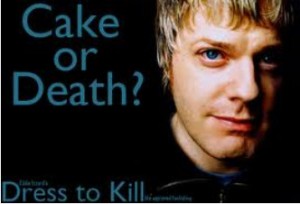 The Eddie Izzard Cake or Death sketch from 1998 rides again, as it shines new light on the UK General Election 2015. Indeed, I much prefer his refreshing new approach to comedy than tired old comedic genres like… oh… party politics, for example. The dislocation of the choice between Cake or Death is much more exorcising than the choice between Labour and Tory, for example, for while it’s a patently absurd comparison in Izzard’s construct, there is – at least – a difference.
The Eddie Izzard Cake or Death sketch from 1998 rides again, as it shines new light on the UK General Election 2015. Indeed, I much prefer his refreshing new approach to comedy than tired old comedic genres like… oh… party politics, for example. The dislocation of the choice between Cake or Death is much more exorcising than the choice between Labour and Tory, for example, for while it’s a patently absurd comparison in Izzard’s construct, there is – at least – a difference.
For a fleeting moment, I was upset to read in today’s Times about Margaret Thatcher’s cynical accession to education secretary Keith Joseph’s initiative to push through GCSEs into the system; not because it was a positive thing for education but because for her not to have done so at the time would have emboldened the trenchant teachers’ union stance that resisted the change from ‘O’ Levels and CSEs. As I said, though, only for a moment…
After all, isn’t this the way of modern politics, that you make tactical sacrifices in pursuit of achieving strategic victory. Put another way, Thatcher deemed it quite acceptable to precipitate what the Times editorial portrayed as the potential blighting of a generation of thickies to keep the militant left in their place.
Also, during the last days of the Thatcher/Major administration the whole country was desperate for anyone or anything to dislodge what was by then an utterly discredited and sleaze-ridden Conservative government. A Sunday Times editorial (April 12th 1992) titled “Socialism, RIP”, however, pointed out that the Labour opposition (sic.) of the time was totally unelectable.
When Tony Blair succeeded John Brown as Labour leader in 1994 it fell to him to sell the electorate on the 14 year-long U-turn-Compendium (embracing matters like Trident, the common market and exchange controls) without making the party look like a duplicitous, shallow, craven and populist movement desperate to get its hands on the levers of power at any cost. The chosen people were desperate for their worship-worthy golden calf and they gobbled up the ultimately false idols Blair conjured up for them. (See Beyond Public Speech and Symbols – Explorations in the Rhetoric of Politicians and the Media)
In the midst of ever more clamorous editorial, radio and TV broadcasts kvetching and yattering about the May election, I was delivered of a Damascene revelation. Although it’s popular to hold the belief that as a nation we are all too sick and tired of politicians to bother to get out the vote, this is just what they want you to think! It is not that politics has worn you out, or that you feel betrayed or even disenfranchised by the weight of world events. It’s because there actually is less and less difference between the parties of political lore (like Labour or Tory), and no merit whatsoever in the parties of current populist clatter (like UKIP). But this is nothing new in itself: voter turnout has been in steady decline since 1945.
Part of Blair’s appeal to the jaded electorate of 1994 was the promise he would be a modernizing leader, whereas in point of fact all he did was mute the core socialist voice of the party in order to get elected. Witness the brouha surrounding the return of the increasingly voluble voice of Old Labour, which interestingly also prompted another memorable instance of the word ‘unelectable’ as a direct consequence of the public falling-out between Blair and Clare Short over MPs’ taxation, among other things.
In his blog of 29 August this year, the (admittedly, ahem… left-of-centre-but-nonetheless-respected) political writer Neil Clark blames current Tory woes on the fact that the party voted in a Blair-clone in the form of David Cameron as their new leader. This too, writes Clark, was in the hope that Cameron would be a modernizer for the Tories. So much for that!
I have not mentioned Ed Miliband because I just can’t be bothered. What is he for?
Indeed, what is parliamentary politics for? Can we not just acknowledge that Conservative thought used to be about creating wealth, preserving The Empire and being as Patrician and kindly as was practical? And further that Labour motivation was to be safe and warm – by working if possible, but if not, as long as someone else pays then that would suffice?
In any event, neither set of ethics is still fit for purpose that I can see.
If we were to abolish these fractured lines and rather have power devolved by non-party, iron-clad pledges on Health, Education, Immigration, Defence, Trade and Infrastructure it might shake things up a bit. Or it might at least present me and my fellow abused voters with a choice that is at least appetizing, hopeful, non-tribal if not intelligible…
Like the choice between cake or death.